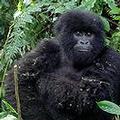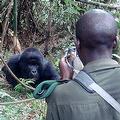 2007年9月,剛果共和國昆達將軍(Laurent Nkunda)領導的反抗軍,將巡守員驅逐出維拉岡國家公園,15個月後,最近重返公園的巡守員終於再度觀察到剛果境內的山地大猩猩(Mountain gorillas)的活動。
2007年9月,剛果共和國昆達將軍(Laurent Nkunda)領導的反抗軍,將巡守員驅逐出維拉岡國家公園,15個月後,最近重返公園的巡守員終於再度觀察到剛果境內的山地大猩猩(Mountain gorillas)的活動。
國際保育組織「世界自然基金會」WWF表示,維拉岡國家公園主管狄梅洛德(Emmanuel de Merode)已成功與努昆達達成協議,讓剛果野生動物總署(ICCN)重返公園南區工作。
目前約僅存700隻野生山地大猩猩,估計約有72隻棲於維拉岡國家公園內。
然而公園中區與東區現在仍舊不安全。因為努昆達軍隊與剛果政府軍持續對戰,現在超過2000名在公園工作的剛果野生動物總署員工及其家屬,必須在公園範圍外與其他受安置的難民共同居住。
1925年創建於剛果共和國的維拉岡國家公園,比鄰盧安達與烏干達,是非洲第一個保護區。雖然是保護區,農作、移民和叛軍的侵擾已造成園內森林的開發失去控制。
剛果內戰頻仍,驅使數千人民逃離,目前估計14.5萬名流離失所者逃散至公園外附近的6處安置區。在此區工作的WWF人員表示,這些人十分需要食物、庇護所以及燃木。
WWF在剛果進行人道救援工作,也在永續種植下分配燃木給園外聚居的流離失所者,並分發燃材耗量較一般少一半的改良鍋爐。
調查發現,剛果當地製造的「火箭爐」(Rocket Stoves)可減少70%木炭和木材耗量。在此區推廣數千家庭使用此爐,將有助於降低大猩猩棲地林的壓力,也能大大增進當地居民的收入與生計,並改善當地居家空氣品質。
WWF國際物種計畫執行長李伯曼(Susan Lieberman)表示:「相信這些因戰亂流離失所的人和大猩猩必定大有關聯。我們供給這些人庇護與生炊所需的基本生存資源,也同時保護維拉崗公園內長期以來受非法盜伐樹材和木炭者破壞的樹木。」
 未來一年,大猩猩保育將被世界最大的幾個保育團體列入最高議程中,尤其是UNEP聯合國環境規劃署(UNEP)。UNEP遷徙物種保育部(UNEP Convention on Migratory Species)、UNEP/UNESCO人猿生存協會(Great Ape Survival Partnership)以及世界動物園暨水族館協會(World Association of Zoos and Aquariums)共同宣定2009年為大猩猩年,並由摩納哥艾伯特王子二世在12月1日於羅馬舉行的UNEP遷徙野生物種保育會議上宣布。
未來一年,大猩猩保育將被世界最大的幾個保育團體列入最高議程中,尤其是UNEP聯合國環境規劃署(UNEP)。UNEP遷徙物種保育部(UNEP Convention on Migratory Species)、UNEP/UNESCO人猿生存協會(Great Ape Survival Partnership)以及世界動物園暨水族館協會(World Association of Zoos and Aquariums)共同宣定2009年為大猩猩年,並由摩納哥艾伯特王子二世在12月1日於羅馬舉行的UNEP遷徙野生物種保育會議上宣布。
而著名的靈長類學家珍古德博士將負責2009大猩猩年中為期12個月的官方活動,藉由改善當地人民生活環境與收入來提升大猩猩保育。
珍古德表示:「居住在曾覆林區域的人們艱困求生,如果我們不伸出援手助其找出不破壞森林的生存之道,這些與我們血緣最親的大猩猩保育工作終將無法成功。」
Mountain gorillas in the Democratic Republic of Congo have been seen by park rangers for the first time since the rangers were forced out of parts of Virunga National Park by Laurent Nkunda's army 15 months ago.
Virunga National Park director, Emmanuel de Merode, successfully negotiated with Nkunda and got confirmation that Institut Congolais pour la Conservation de la Nature, ICCN, would be allowed to reenter and work in the southern part of the park, according to the global conservation organization WWF.
There are only about 700 mountain gorillas left in the wild, and Virunga National Park is thought to be inhabited by around 72 of the animals.
The central and eastern sectors of the park remain unsafe. More than half of the 2,000 ICCN's staffers and their families who work in Virunga National Park are now living at sites for internally displaced persons outside of the park because of fighting between Nkunda's army and the Congolese army.
Virunga National Park was created in 1925 as Africa's first protected area and is located in the eastern part of the DRC, bordering Rwanda and Uganda. Despite its protected status, encroachment for farming and settlement, as well as by warring rebel factions, is leading to uncontrolled exploitation of its forests.
The conflict in the Congo has forced thousands of people to flee their homes and there are now an estimated 145,000 internally displaced persons scattered in six sites just outside of the national park. The people living in these sites are in desperate need of food, shelter and fuelwood, says WWF, which has been working in the area.
WWF has been focusing its efforts in the area on the humanitarian crisis caused by the conflict and is distributing fuelwood from sustainable tree plantations to people living in the internally displaced persons' sites. WWF has been passing out improved cooking stoves, which use half the amount of fuelwood as a normal stove.
Tests in the DRC have found that the locally made "Rocket Stoves" can cut charcoal and wood use by up to 70 percent. Expanding the distribution of the stoves to thousands of homes in the region could help reduce pressure on gorilla forest habitats; boost incomes and livelihoods for local people and improve air quality in local homes.
"WWF believes that the needs of people displaced by the fighting and the gorillas are inextricably linked. We are providing displaced people with the basic resources they need for shelter and cooking, while at the same time protecting Virugna National Park's forests, which are already heavily damaged by illegal logging for wood and charcoal," said Dr. Susan Lieberman, Director of WWF International's Species Programme.
In the coming year, gorilla conservation will be high on the agenda for some of the world's largest conservation organizations, particularly the UN Environment Programme, UNEP.
The UNEP Convention on Migratory Species, the UNEP/UNESCO Great Ape Survival Partnership and the World Association of Zoos and Aquariums have partnered to declare 2009 the Year of the Gorilla.
Prince Albert II of Monaco launched the Year of the Gorilla initiative December 1 at the opening of the UNEP Convention on Migratory Species' wildlife conference in Rome.
Renowned British primatologist Jane Goodall, PhD, DBE, will serve as the official patron of the 2009 Year of the Gorilla, a 12-month campaign aimed at improving gorilla conservation by bettering the livelihoods and incomes of local people.
"People living in and around the last forested areas are struggling to survive," said Dr. Goodall. "If we can't help these people find ways of living that do not involve continual destruction of the forest, we shall fail in our efforts to protect these wonderful great apes - our closest living relatives."




